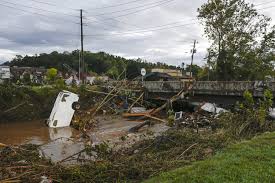
Disaster relief efforts are struggling in the aftermath of Hurricane Helene. Many people are still without power and water. The Federal Emergency Management Agency (FEMA) is facing significant financial challenges. Reports suggest that funding issues may be related to increased spending on immigration matters.
On September 6, a White House press conference raised eyebrows when officials stated that FEMA had been diverting funds to address various immigration issues. This claim has caused concern among disaster relief advocates. However, the White House has since denied that FEMA uses funds for immigration purposes. This change in narrative has left many needing clarification about where the money is going.
Meanwhile, the Cajun Navy, a volunteer rescue group, reported harassment from an unknown Black Hawk helicopter over a staging area. This incident has raised questions about the coordination and transparency of the ongoing relief efforts. Many volunteers are trying to provide aid, but they are facing obstacles.
FEMA has also imposed strict restrictions on outside groups trying to bring supplies. Only pre-approved organizations can deliver aid, which has frustrated many local volunteers. These restrictions leave many communities isolated, as supplies are confiscated at checkpoints.
In a recent statement, FEMA acknowledged that it does not operate in areas without passable roads. This policy has left numerous communities cut off from essential services, and residents in these areas report feeling abandoned and helpless.
Reports from people affected by the hurricane indicate that FEMA is rejecting many applications for assistance. This has led to frustration and despair among those struggling to recover from the storm, and many are questioning the effectiveness of FEMA’s response.
Despite these challenges, military resources have significantly impacted some areas. Troops have been deployed to assist with rescue operations and deliver supplies. Their presence has relieved affected residents, but the situation remains dire.
Thousands are still without necessities. Power restoration efforts are ongoing, but progress is slow. Water shortages are also a pressing issue, with many people relying on bottled water daily. Local governments and volunteers are stepping in to fill the gaps where FEMA’s response needs to catch up.
As the recovery efforts continue, many call for greater accountability and transparency from FEMA. The community is coming together to support one another, but adequate federal support is critical. The discrepancies in funding and restrictive policies have raised concerns about the future of disaster relief in the area.
In the coming weeks, it will be crucial for FEMA to clarify its funding sources and priorities. The people affected by Hurricane Helene deserve a clear answer and assurance that they will receive the help they need to rebuild their lives. As the situation unfolds, the community hopes for a more coordinated and effective response from all levels of government.




